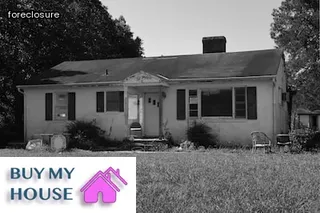Foreclosures can be a difficult topic to navigate, but there are both pros and cons to consider. On the plus side, foreclosure is a way for people who have fallen behind on their mortgage payments to avoid total financial ruin.
Foreclosure also gives distressed homeowners the opportunity to start fresh by finding a more affordable home. However, foreclosures come with some drawbacks, too.
For starters, it can affect your credit score for up to seven years and make it difficult to get approved for new loans in the future. Additionally, foreclosure can be an emotionally taxing experience that often leaves people feeling overwhelmed by the situation they’re in.
Though foreclosure isn’t ideal, it may be necessary depending on each person’s unique financial circumstances. Being aware of all of your options is key when making this kind of decision.

Foreclosure is an expensive and often time consuming process that has a lasting impact on your financial health. The cost implications of foreclosure are significant and should not be overlooked.
Foreclosure can result in the loss of your home, as well as additional fees, such as back taxes, late fees, and other legal costs associated with the foreclosure process. It may also lead to credit score damage that could affect future mortgage applications or other loan applications you make.
Additionally, lenders are likely to require a larger down payment if you’re looking to purchase another property after a foreclosure. Finally, in some cases, foreclosures may even lead to tax liabilities for borrowers if the amount forgiven by the lender is considered income by the IRS.
Understanding these cost implications of foreclosure can help you make informed decisions about how to prevent it from happening in the first place.
Foreclosure is a type of legal process that can be initiated by a lender when a borrower defaults on their mortgage loan. The two main types of foreclosure are judicial and non-judicial.
Judicial foreclosure requires the lender to file a lawsuit and obtain a court order allowing them to repossess the property and sell it at auction in order to recoup the unpaid balance of the loan. Non-judicial foreclosure, also known as power of sale, is conducted without court supervision and allows the lender to sell the property outside of court proceedings.
Depending on the laws in your state, lenders may also utilize other methods such as deed in lieu of foreclosure or pre-foreclosure sale agreements. It is important to understand these different types of foreclosure as it can have an extensive impact on your financial situation if you default on your mortgage loan.

Foreclosure is a stressful and difficult process that can have a huge financial impact on your life. It is important to understand the process of foreclosure and its implications so that you can take steps to minimize the damage it may cause.
The first step in minimizing this negative financial outcome is to be aware of what foreclosure is and how it works. Foreclosure occurs when a homeowner fails to make their mortgage payments, leading the lender to repossess the house or property.
The process differs from state to state, but typically consists of several stages such as default notices, auctioning of properties, and evictions. Once your home has been foreclosed on, it will most likely be sold at an auction for far less than its market value, resulting in a major financial loss for you.
To prevent foreclosure, start by creating a budget and sticking to it. If you are having trouble making your mortgage payments, contact your lender immediately and explain the situation; they may offer alternatives such as loan modification or forbearance that can help you stay in your home.
Additionally, saving an emergency fund can help cover unexpected costs like missed payments if necessary; having cash reserves can also make it easier for lenders to approve loan modifications since they will feel more secure about their investment in you. Finally, consider speaking with an experienced housing counselor who can provide advice on how to manage debts or access local resources that may further reduce financial burden associated with foreclosure.
When facing the possibility of a foreclosure, it is important to strategize ahead of time to stay on top of the situation. Knowledge is power and understanding the process can help you make more informed decisions about your home.
First, educate yourself about the definition of foreclosure and what it means for you as it varies from state to state. Second, familiarize yourself with the foreclosure process and timeline so that you know what to expect.
Third, investigate options like loan modification or refinancing in order to keep up with payments or reduce them if possible. Fourth, be proactive in establishing healthy financial habits such as budgeting and creating an emergency fund which will help prepare you for unexpected costs or expenses.
Finally, consider consulting with a professional such as a credit counselor or housing counselor who can provide additional advice or resources towards avoiding foreclosure altogether. Taking these steps early will help ensure that you are best prepared to handle any potential foreclosure situation that may arise.

When it comes to foreclosure, there are a few alternatives that may be worth considering. Refinancing is an option for homeowners who can no longer afford their payments but have equity in their homes and meet the criteria to refinance.
Loan modification is another potential alternative, where borrowers can work with lenders to adjust the terms of their loan, such as interest rate or loan length. A short sale is when homeowners sell their homes for less than what is owed on the mortgage, wherein lenders accept this reduced amount as payment in full.
In some cases, a deed-in-lieu of foreclosure may be available; here, homeowners turn over ownership of the home to the lender in exchange for debt forgiveness. Finally, if all else fails, bankruptcy could provide relief from foreclosure proceedings and give homeowners time to resolve other financial issues.
Ultimately, there are several alternatives that should be explored before resorting to foreclosure.
Loan modification is one of the most popular strategies for preventing foreclosure. It involves a lender changing the terms of an existing mortgage loan in order to make it more manageable for the borrower.
This can include reducing payments, extending repayment periods, or changing interest rates and other elements that impact monthly payments. Loan modification can help borrowers avoid going into foreclosure by making loan payments easier to manage.
In many cases, loan modification can also reduce the total cost of the debt over time. When considering loan modification as a foreclosure prevention strategy, it’s important to consider all options and weigh them against your individual financial situation.
Before signing any documents or agreeing to any changes, be sure to read through everything thoroughly and seek advice from an experienced financial advisor if needed.

Many people have misconceptions about foreclosures, mainly due to lack of knowledge about the process and how it works. Foreclosure is a legal process that can be initiated by a lender when a borrower fails to make their mortgage payments.
It does not mean that the homeowner will automatically lose their home; instead, it provides an opportunity for the homeowner to work with their lender to come up with a solution. It is also important to note that foreclosure is not necessarily caused by financial hardship, but can be triggered by things such as job loss or illness.
Additionally, homeowners may be able to avoid foreclosure entirely if they are proactive in contacting their lenders and working out an agreement or offering alternative payment arrangements. Finally, although the process of foreclosure can take anywhere from several months to over a year, it is possible for homeowners to stop the proceedings at any point if they are able to reinstate their loan or sell the property before it goes into foreclosure.
Foreclosure can be a stressful and overwhelming experience, but it doesn't have to be the end of your credit. It's possible to protect your credit score and rebuild your credit after foreclosure with some simple steps.
The first step is to know where you stand; get a copy of your credit report and review it for accuracy. Make sure all information related to the foreclosure is correct, as any errors or discrepancies could potentially hurt your score.
Next, pay close attention to any new debt you take on in the future. While it may be tempting to obtain multiple loans or open a lot of new accounts, this can negatively impact your credit score.
Instead, focus on making timely payments on existing accounts and keeping balances low. Additionally, consider signing up for automatic payments as a way to ensure bills are paid in full and on time each month.
Finally, seek out resources like counseling services from reputable organizations that can provide guidance when needed. Taking these proactive steps can help you recover from foreclosure and protect your credit going forward.

When it comes to foreclosure, assessing the legal ramifications is an important task. Foreclosure is a legal process that involves both lenders and borrowers, so understanding the laws surrounding this situation is key in making decisions about your financial future.
Every state has different laws regarding foreclosure, so it's important to research the specific regulations in your area before taking any action. Generally speaking, however, foreclosure proceedings can include everything from court hearings to repossession of property.
The consequences of a foreclosure can also vary depending on the circumstances. It's possible for borrowers to be held responsible for paying back the balance due on their mortgage even after their home has been foreclosed upon.
Additionally, it's possible for lenders to assess penalties or fees during the process which could add up quickly. Lastly, a foreclosure will almost certainly impact an individual's credit score and could make it difficult to obtain financing in the future.
With all of these potential outcomes in mind, it's essential to weigh your options carefully before making any decisions about entering into or proceeding with foreclosure proceedings.
Navigating the mortgage system during a foreclosure crisis can be overwhelming and intimidating for many homeowners. While understanding the legal and financial ramifications of this process can seem difficult, knowing the basics of foreclosures is key to staying ahead of the curve.
A complete guide to foreclosures includes its definition, processes, prevention strategies, and how it impacts you as an individual. Definition-wise, foreclosure is a legal process in which a lender takes possession of a property after the borrower has defaulted on their mortgage payments.
The actual foreclosure process typically involves several steps such as filing with court documents, posting notices in public places, and scheduling an auction to sell the property. To prevent foreclosure, homeowners should be aware of their options like refinancing or loan modification to ease their financial burdens.
Understanding what foreclosure means for you is crucial in order to make informed decisions about your future. It is important to consult with a qualified financial advisor who can provide advice tailored specifically to your needs and circumstances.

Bartering is an increasingly popular way to offset the financial losses associated with foreclosure. Before bartering, it is important to consider the legal and tax implications of trading goods or services.
If you are considering bartering in order to prevent or delay foreclosure, it is important to speak with an attorney or accountant who can help you make sure that any trades you make comply with applicable laws and regulations. Additionally, when trading for goods or services, it is essential to ensure that all parties involved are aware of their expectations and responsibilities before entering into a trade agreement.
Bartering can provide a great opportunity for homeowners facing foreclosure to reduce their debt burden without having to dip into their savings accounts. However, it is important to be mindful of potential risks associated with bartering and take appropriate steps to protect yourself from financial loss or liability.
If you’ve gone through the process of foreclosure, it’s important to recognize that there is a way to recover financially and move forward. The first step in the recovery process is understanding how much financial loss has been incurred, which can vary depending on the type of foreclosure and the specific circumstances surrounding it.
After assessing the losses, it's important to consider how best to rebuild your credit score so that you can begin restoring your finances. This could involve making sure all bills are paid on time, building a savings account for emergency expenses, and applying for a loan or debt consolidation if needed.
Additionally, you may want to look into any government assistance that could provide help with housing costs or other expenses related to foreclosure. Finally, don’t forget to take care of yourself emotionally by seeking out support from friends and family or finding a counselor who understands what you’re going through.
With these steps taken, recovering from a home foreclosure can become more manageable and you can start rebuilding your life again.

The federal government regulates the foreclosure process through several laws and regulations. The most important of these, which covers most types of mortgage loans, is the Truth in Lending Act (TILA).
This law requires lenders to provide borrowers with a disclosure statement outlining the terms of their loan and any associated fees or costs. Additionally, the Real Estate Settlement Procedures Act (RESPA) and Homeowners Protection Act (HPA) protect consumers from deceptive practices by requiring lenders to disclose certain information about their loan before closing.
Furthermore, the Fair Debt Collection Practices Act (FDCPA) ensures that lenders follow legal procedures when collecting payments from borrowers who have fallen behind on their mortgages. Finally, the Equal Credit Opportunity Act (ECOA) prohibits discriminatory lending practices related to race, gender, religion, national origin, and other factors.
All of these laws are designed to ensure that homeowners understand the foreclosure process and have access to fair lending practices.
Working with a real estate agent to avoid or stop home foreclosures can be a great way to take control of your situation and protect your financial future. Before you make any decisions, it is important to understand the foreclosure process and what it means for you.
A qualified real estate agent can provide advice on the best course of action, whether that means negotiating with your lender or pursuing other options. They will also be able to direct you to resources available in your area such as legal aid or loan modification programs that could help you keep your home.
Additionally, they can help create a plan to improve your credit score and make sure all payments are made on time going forward so that foreclosure does not become an issue in the future. When seeking out an agent, look for someone who specializes in foreclosure prevention and has experience working with lenders in your area.
This will ensure that you get the most complete advice possible tailored specifically for you and your situation.

The government offers several programs that can help those struggling to pay their mortgage. The Home Affordable Modification Program (HAMP) allows borrowers to reduce their monthly payments by changing the terms of the loan, such as reducing the interest rate or extending the repayment period.
Another option is forbearance, which temporarily suspends a borrower’s payments for up to 12 months and reduces or suspends part of the principal balance. The Home Affordable Refinance Program (HARP) helps eligible borrowers refinance their mortgages at more favorable terms than through traditional means.
Additionally, the Federal Housing Authority (FHA) provides insurance for lenders who are willing to take on higher-risk borrowers and offer more flexible loan terms. Finally, several states have implemented foreclosure mediation programs that provide homeowners with an extra layer of protection from lenders by offering them a chance to work out a payment plan before they face foreclosure.
Understanding these government programs can be key in preventing foreclosure and managing home loan repayments.
There are numerous advantages to a short sale compared to a home foreclosure. The most important benefit is that it will not stay on a homeowner's credit report as long as a foreclosure would.
A short sale typically stays on a credit report for two years, while a foreclosure can remain there for up to seven years. This means that after the two-year period, the homeowner can start rebuilding their credit score more quickly than if they were foreclosed upon.
Additionally, the amount of money owed to creditors in the event of a short sale is typically lower than what is required in the case of a foreclosure. This could be especially beneficial for those who are already struggling with financial hardship and cannot afford to pay off large sums at once.
Lastly, some lenders may even offer incentives such as waiving late fees or allowing homeowners to keep part of their equity from the sale if they opt for a short sale over foreclosure.

When considering a home purchase, it is important to consider the risk factors associated with potential home ownership. While there are many mortgage options available, foreclosure is a very real possibility when homeowners become unable to make payments.
Bankruptcy can be an option for avoiding or stopping foreclosure in certain circumstances. When evaluating mortgage rates, it is essential to research and understand the risks involved in order to protect yourself from potential financial losses due to foreclosure.
It may be beneficial to consult with a professional who can help you assess your unique situation and determine if bankruptcy might be the best course of action for avoiding foreclosure and its associated costs. Knowing the process of foreclosure, as well as how it may affect you financially, is key in making informed decisions about potential home ownership.
Foreclosure is the legal process in which a lender attempts to recover a debt from a borrower who has failed to make payments on their loan. When a borrower defaults on their mortgage loan, the lender can start the process of foreclosure, which involves taking possession of the mortgaged property and selling it at public auction.
Foreclosure is not just limited to mortgages; it can also be used for other types of loans such as car loans or business loans. Foreclosure can result in significant financial losses for borrowers, so it's important to understand how this process works and what steps you can take to prevent it.
Knowing the basics of foreclosure will help you make informed decisions about your finances and protect your financial future.

Foreclosure is a legal process that occurs when a homeowner fails to make full mortgage payments, and the lender begins the process of reclaiming the home. There are five stages of foreclosure action that a homeowner should be aware of: Default, Acceleration, Notice of Sale, Foreclosure Sale and REO (Real Estate Owned). Default is the stage where the borrower has failed to make timely payments as outlined in their loan agreement.
At this stage, a notice of default will be sent to the homeowner notifying them that if payment is not made immediately, foreclosure proceedings will begin. Acceleration occurs after default has been declared and allows the entire amount due on the loan to become due immediately. This means that no more payments can be made until all past due amounts have been paid in full.
After acceleration, a Notice of Sale will be sent to the borrower informing them that a foreclosure sale date has been set and giving them details about it. This notice must also be published in a local newspaper for three weeks prior to the sale date. At this point, Foreclosure Sale takes place in which potential buyers can bid on the property at auction and compete against each other for ownership rights.
The highest bidder wins and becomes the new owner of the property. If there are no bidders or if all bids are lower than what is owed on the property, then it will become Real Estate Owned (REO) by either an entity or individual who bought back at auction or an entity or individual who purchased directly from the lender after auction fails to attract bidders. It is important for homeowners to understand these five stages of foreclosure action so they can prepare themselves for how long it may take and how much money they may owe in order to keep their homes.
Knowing what steps need to be taken ahead of time can help homeowners avoid or reduce any debt associated with foreclosure proceedings.
A foreclosure is a legal process in which a homeowner's mortgage lender attempts to recover the balance of an unpaid loan by forcing the sale of the mortgaged property. The foreclosure process begins when the borrower defaults on his or her payments, either by failing to make payments or by making late payments.
Once the default has been established, the lender will typically file a lawsuit against the homeowner and obtain a court order authorizing foreclosure. The court order serves as notice to the homeowner that his or her rights in the property are being terminated and that it is time to vacate.
If the homeowner does not pay off the debt or negotiate an arrangement with the lender, then foreclosure proceedings can begin. Ultimately, if all other options fail, then it may result in a sheriff’s sale of the property, wherein proceeds from its sale are used to satisfy any outstanding debts owed by the homeowner.
Foreclosure is a legal process in which an individual or entity, such as a lender or government agency, can take back ownership of a property when the owner fails to make payments on a loan that was used to purchase the property. One example of foreclosure is when an individual takes out a loan to purchase a home and then fails to make payments for three consecutive months.
The lender will then begin the foreclosure process by sending the homeowner official notice that they are in default of their loan agreement. Once this notice has been sent, the homeowner has 30 days to make their payments current before the lender can proceed with foreclosure.
If the homeowner fails to do so, the lender will move forward with filing for foreclosure, which could ultimately result in them taking ownership of the home.